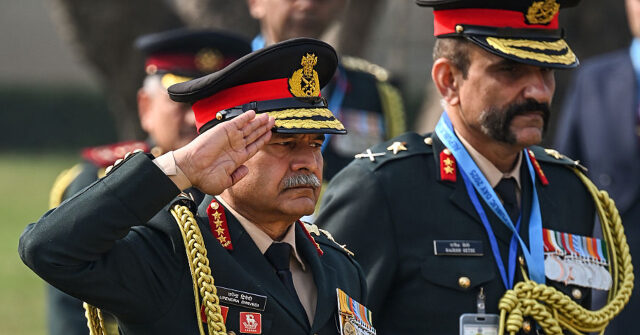Gen. Upendra Dwivedi, four-star general of the Indian army, arrived in Kashmir on Friday to assess the security situation after Tuesday’s deadly terrorist attack.
India has accused Pakistan of facilitating the attack, moving the two nuclear-armed nations to the brink of conflict.
Dwivedi traveled to the Kashmir city of Srinagar the day after Prime Minister Narendra Modi vowed to pursue the masterminds of the Pahalgam attack “to the ends of the earth” and make them “pay beyond their imagination.”
The army chief visited India’s Northern Command headquarters upon arrival for a briefing on counter-terrorism operations and the status of forces along the Line of Control (LoC), the uneasy border between Indian and Pakistani territory in the Jammu-Kashmir region.
Responsibility for the attack, in which 26 male Hindu tourists were slaughtered while women and Muslims were spared, was claimed by a Kashmiri militant group. India believes the true perpetrator is a Pakistan-based jihadi organization called Lashkar-e-Taiba (LT).
On Thursday, India named three LT members as suspects, two of them Pakistanis and the third from Kashmir. Indian security forces raided the homes of two LT suspects on Thursday. Both homes were destroyed during the raids, by what the police described as pre-planted explosive booby traps. Indian army engineers spotted the explosives in the second house and preformed a controlled detonation.
By Friday, India and Pakistan had withdrawn their diplomatic personnel from each other’s capitals, canceled visas for each other’s visitors, and suspended longstanding trade agreements. Leading Indian politicians have demanded military action against either LT targets on Pakistani soil, or Pakistan itself. Pakistani officials, in turn, denounced India’s suspension of a vital water rights treaty as a potential “act of war.”
A senior official in the Pakistan-controlled portion of Kashmir said on Friday that Indian and Pakistani troops exchanged small-arms fire in the Leepa valley last night. The Indian army said Pakistani forces initiated the conflict and their provocations were “effectively responded to.” No casualties were reported by either side.
The United Nations on Friday urged both India and Pakistan to “exercise maximum restraint and to ensure that the situation and the developments we’ve seen do not deteriorate any further.”
“Any issues between Pakistan and India, we believe can be and should be resolved peacefully, through meaningful, mutual engagement,” the U.N. said.
Pakistani Deputy Prime Minister Isaq Dar, who also serves as his country’s foreign minister, angered India on Friday by suggesting the perpetrators of the Pahalgam attack “might be freedom fighters.”
“I believe that [the Indians] have tried to cover up their failures of internal matters and domestic politics by indirectly blaming Pakistan yet again,” Dar said.
Read the full article here


